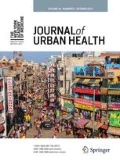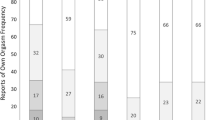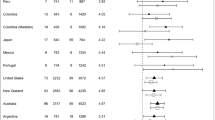Abstract
This study analyzed data from a large prospective epidemiologic cohort study among men who have sex with men (MSM), the Multicenter AIDS Cohort Study, to assess syndemic relationships among Black MSM in the cohort (N = 301). We hypothesized that multiple interconnections among psychosocial health conditions would be found among these men, defining syndemic conditions. Constituents of syndemic conditions measured included reported depression symptoms, sexual compulsiveness, substance use, intimate partner violence (IPV), and stress. We found significant evidence of syndemics among these Black men: depression symptoms were independently associated with sexual compulsiveness (odds ratios [OR]: 1.88, 95% CI = 1.1, 3.3) and stress (OR: 2.67, 95% CI = 1.5, 4.7); sexual compulsiveness was independently associated with stress (OR: 2.04, 95% CI = 1.2, 3.5); substance misuse was independently associated with IPV (OR: 2.57, 95% CI = 1.4, 4.8); stress independently was associated with depression symptoms (OR: 2.67, 95% CI = 1.5, 4.7), sexual compulsiveness (OR: 2.04, 95% CI = 1.2, 3.5) and IPV (OR: 2.84, 95% CI = 1.6, 4.9). Moreover, men who reported higher numbers of syndemic constituents (three or more conditions) reportedly engaged in more unprotected anal intercourse compared to men who had two or fewer health conditions (OR: 3.46, 95% CI = 1.4–8.3). Findings support the concept of syndemics in Black MSM and suggest that syndemic theory may help explain complexities that sustain HIV-related sexual transmission behaviors in this group.
Similar content being viewed by others
References
Meyer IH. Prejudice, social stress, and mental health in lesbian, gay, and bisexual populations: conceptual issues and research evidence. Psychol Bull. 2003; 129(5): 674.
Meyer IH. Minority stress and mental health in gay men. J Health Soc Behav. 1995; 36: 38–56.
Stall R, Mills TC, Williamson J, et al. Association of co-occurring psychosocial health problems and increased vulnerability to HIV/AIDS among urban men who have sex with men. Am J Publ Health. 2003; 93(6): 939–942.
McCarthy K, Wimonsate W, Guadamuz T, et al. Syndemic analysis of co-occurring psychosocial health conditions and HIV infeciton in a cohort of men who have sex with men (MSM) in Bangkok, Thailand. Paper presented at: International AIDS Conference 2010; July 18–23, 2010; Vienna, Austria.
Mansergh G, Naorat S, Jommaroeng R, et al. Inconsistent condom use with steady and casual partners and associated factors among sexually-active men who have sex with men in Bangkok, Thailand. Aids Behav. 2006; 10(6): 743–751.
Li A, Varangrat A, Wimonsate W, et al. Sexual behavior and risk factors for HIV infection among homosexual and bisexual men in Thailand. Aids Behav. 2009; 13(2): 318–327.
Mustanski B, Garofalo R, Herrick A, Donenberg G. Psychosocial health problems increase risk for HIV among urban young men who have sex with men: preliminary evidence of a syndemic in need of attention. Ann Behav Med. 2007; 34(1): 37–45.
Millett GA, Flores SA, Peterson JL, Bakeman R. Explaining disparities in HIV infection among black and white men who have sex with men: a meta-analysis of HIV risk behaviors. AIDS. 2007; 21(15): 2083.
Millett GA, Peterson JL, Wolitski RJ, Stall R. Greater risk for HIV infection of black men who have sex with men: a critical literature review. Am J Publ Health. 2006; 96(6): 1007.
Garofalo R, Mustanski B, Johnson A, Emerson E. Exploring factors that underlie racial/ethnic disparities in HIV risk among young men who have sex with men. J Urban Health. 2010; 87(2): 318–323.
Fullilove MT, Fullilove RE. Stigma as an obstacle to AIDS action. Am Behav Sci. 1999; 42(7): 1117.
Young RM, Meyer IH. The trouble with “MSM” and “WSW”: erasure of the sexual-minority person in public health discourse. Am J Publ Health. 2005; 95(7): 1144.
Kaslow RA, Ostrow DG, Detels R, Phair JP, Polk BF, Rinaldo CR Jr. The Multicenter AIDS Cohort Study: rationale, organization, and selected characteristics of the participants. Am J Epidemiol. 1987; 126(2): 310–318.
Detels R, Phair JP, Saah AJ, et al. Recent scientific contributions to understanding HIV/AIDS from the Multicenter AIDS Cohort Study. J Epidemiol (Japan). 1992; 2: S11–S19.
Dudley J, Jin S, Hoover D, Metz S, Thackeray R, Chmiel J. The Multicenter AIDS Cohort Study: retention after 9 1/2 years. Am J Epidemiol. 1995; 142(3): 323–330.
Stall R, Friedman M, Catania J. Interacting epidemics and gay men’s health: a theory of syndemic production among urban gay men. Unequal Opportunity: Health Disparities Affecting Gay and Bisexual Men in the United States. 2007. doi:10.1093/acprof:oso/9780195301533.003.0009
Radloff L. The CES-D scale: a self-report depression scale for research in the general population. Appl Psychol Meas. 1977; 1(3): 385.
Ostrow DG, Monjan A, Joseph J, et al. HIV-related symptoms and psychological functioning in a cohort of homosexual men. Am J Psychiatry. 1989; 146(6): 737–742.
Miner MH, Coleman E, Center BA, Ross M, Rosser BRS. The compulsive sexual behavior inventory: psychometric properties. Arch Sex Behav. 2007; 36(4): 579–587.
Catania JA, Osmond D, Stall RD, et al. The continuing HIV epidemic among men who have sex with men. Am J Publ Health. 2001; 91(6): 907–914.
Jaffee KD, Liu GC, Canty-Mitchell J, Qi RA, Austin J, Swigonski N. Race, urban community stressors, and behavioral and emotional problems of children with special health care needs. Psychiatr Serv. 2005; 56(1): 63–69.
Herek GM. Hate crimes and stigma-related experiences among sexual minority adults in the United States: prevalence estimates from a national probability sample. J Interpers Violence. 2009; 24(1): 54–74.
Andrews B, Qian M, Valentine JD. Predicting depressive symptoms with a new measure of shame: the experience of shame scale. Br J Clin Psychol. 2002; 41(Pt 1): 29–42.
Lee R, Robbins S. The relationship between social connectedness and anxiety, self-esteem, and social identity* 1. J Counsel Psychol. 1998; 45(3): 338–345.
Herek G, Cogan J, Gillis J, Glunt E. Correlates of internalized homophobia in a community sample of lesbians and gay men. J Gay Lesb Med Assoc. 1998; 2: 17–26.
Williams D, Yu Y, Jackson J, Anderson N. Racial differences in physical and mental health. J Health Psychol. 1997; 3(2): 335–351.
Mays VM, Cochran SD. Mental health correlates of perceived discrimination among lesbian, gay, and bisexual adults in the United States. Am J Public Health. 2001; 91(11): 1869–1876.
SPSS. Base 18.0 for windows user’s guide. Chicago, IL: SPSS Inc; 2009.
Centers for Disease Control and Prevention. http://www.cdc.gov/syndemics/. Accessed July, 2009.
Frost DM, Meyer IH. Measuring community connectedness among diverse sexual minority populations. J Sex Res. 2012; 49(1): 36–49.
Raymond HF, McFarland W. Racial mixing and HIV risk among men who have sex with men. Aids Behav. 2009; 13(4): 630–637.
Schneider TWJA, Cornwell B, Ostrow D, Michaels S, Friedman S, Laumann E. Black Men who have sex with men health center affiliation networks: HIV prevention and treatment utilization patterns. Age.20(41): 21.20.
Savage D, Miller T. It Gets Better: Coming out, Overcoming Bullying, and Creating a Life Worth Living. Los Angeles, CA: Dutton Penguin; 2011.
Sources of support
The Multicenter AIDS Cohort Study is funded by the National Institute of Allergy and Infectious Diseases, with additional supplemental funding from the National Cancer Institute, and the National Heart, Lung, and Blood Institute: U01-AI-35042, 5-M01-RR-00052 (GCRC), U01-AI-35043, U01-AI-37984, U01-AI-35039, U01-AI-35040, U01-AI-37613, and U01-AI-35041. Additional support was provided by the National Institute of Drug Abuse through 1 R01 DA022936, “Long Term Health Effects of Methamphetamine Use in the MACS,” Ronald Stall, Ph.D., PI, 5 P30 MH058107, “Intervention Core for the Center for HIV Identification, Prevention and Treatment Services,” Steve Shoptaw Co-PI, T32 DA007292-17, William Latimer, PI and R25 MH080664, Gail Wyatt, PI, USA.
Author information
Authors and Affiliations
Corresponding author
Rights and permissions
About this article
Cite this article
Dyer, T.P., Shoptaw, S., Guadamuz, T.E. et al. Application of Syndemic Theory to Black Men Who Have Sex with Men in the Multicenter AIDS Cohort Study. J Urban Health 89, 697–708 (2012). https://doi.org/10.1007/s11524-012-9674-x
Published:
Issue Date:
DOI: https://doi.org/10.1007/s11524-012-9674-x




